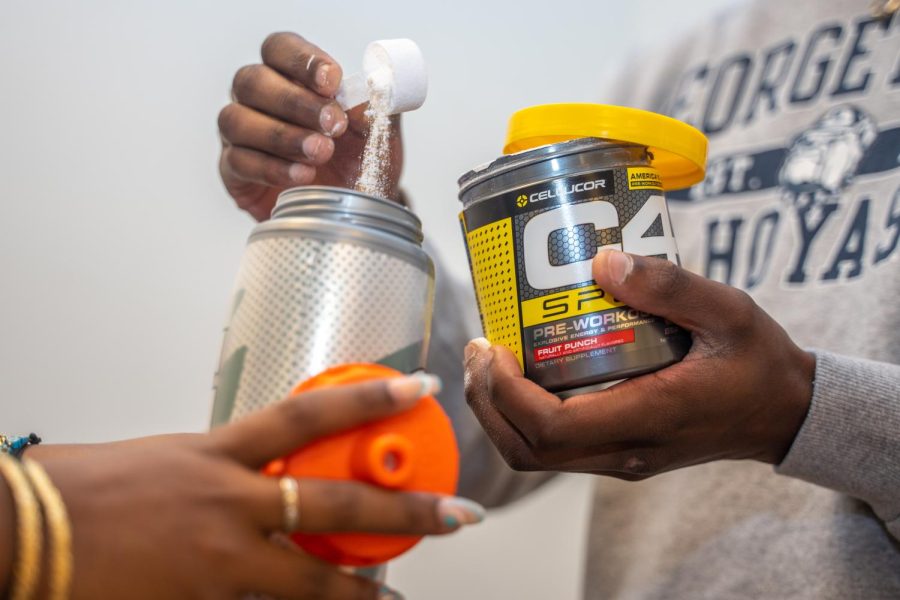Pre-workout: Popular yet precarious
FULL SCOOP. While pre-workout is popular with athletes, the health impacts are unclear. Many student ath- letes utilize the substance as an energy boost for their workouts as it often features ingredients such as caffeine.
May 5, 2023
Scoop. Gulp. Lift. Run. Crash. Repeat.
This is the routine of many student athletes who use pre-workout products to elevate their athletic performance while exercising. The substance has gained popularity with teenage athletes even though research on the usage and effects of the substance in adolescents is limited and therefore should be used with caution.
Pre-workout products usually come in the forms of powder and pills that can be added to liquids and are specifically used for athletics. Most are a mix of high amounts of caffeine and different vitamins, and they are believed to increase energy levels and endurance while working out.
Experts in nutritional health suggest that pre-workout substances are not thoroughly studied and are not a necessary part of increasing one’s athletic performance.
Adriana Luster, a school nutrition specialist at Chicago Public Schools, said there just isn’t enough research on pre-workout products to understand the full impacts it has on users, specifically young ones, in the short or long term.
Furthermore, Devanee Washington, a registered dietician, notes that pre-workout products are not approved by the Food and Drug Administration and have complicated compositions and impacts. She suggested that users of pre-workout evaluate what they want out of the supplement and replace it with whole food sources that provide the same vitamin or benefit.
Despite this, many U-High students use pre-workout products because of the high levels of caffeine that are easy to ingest quickly.
Senior Sydney Tyler is a fencer and uses pre-workout powders before she trains, specifically for weightlifting. She prefers pre-workout to other caffeinated products because it allows her to ingest caffeine easily through consuming the raw powder, or “dry-scooping.”
“I absolutely love using pre-workout because I feel like for other caffeine drinks, even energy drinks such as stupid Celsius, Alani Nu and Monster drinks, which I don’t use, sometimes take a while to kick in and you have to drink a whole 16-ish ounces just to get 200 milligrams of caffeine, but with pre-workout, I just dry scoop it, and it’s one or two sips and I’m good to go,” she said. “I feel like I could run a whole freaking race in two seconds.”
The caffeine, creatine and glucose found in pre-workout are responsible for most of the energizing properties of the substance. However the caffeine levels in pre-workout range from 150-300 milligrams per serving. Considering the Food and Drug Administration’s recommendation for daily caffeine intake is 400 milligrams, the high caffeine levels of pre-workout substances can negatively impact its users. This includes “crashing,” tiredness caused as the stimulating effects of the substance wear off, and withdrawals as users can grow dependent on caffeine chemically and develop symptoms like headaches and grogginess without using it for extended periods of time.
Sydney said that pre-workout can cause her to crash, but since she always goes to bed after working out, it does not adversely affect her significantly.
She said, “There’s usually a huge crash because of pre-workout, but I always go basically right to bed after I use my pre-workout, so I don’t care that much about it.”
Ms. Washington said in an email that using pre-workout in addition to a daily caffeine intake can negatively affect its users and should be used with caution.
“Caffeine is also a key ingredient in pre-workout supplements that has been said to increase energy and endurance during exercise. But if your usual diet already includes coffee, tea, energy drinks or chocolate, then you may want to stay away from these foods and beverages on the days you take pre-workout. Too much caffeine can have adverse effects ”
Junior Adam Syverson, a U-High baseball player, regularly uses pre-workout powders. He attributes a short-term tingling sensation in his face and body to that of a naturally produced beta-alanine amino acid found in many pre-workout products, which increases muscle carnosine and is known to improve the efficacy of exercise.
“I have no idea what it actually does, but all I know is that it makes you tingle. The more there is, the more you’ll tingle, and it can get very intense sometimes,” he said. “It goes through different parts of your body. And once it gets to like your face, it makes your face itch for like a minute, but then it cools down.”
Sophomore volleyball player Emma Heo uses pre-workout exclusively while working out and weightlifting but says she wouldn’t use it while playing her sport or for general caffeine consumption.
“I use pre-workout pretty much every time I workout, primarily when I lift, because it gives me a lot more energy,” she said. “I feel that it gives me really good results. However, outside of working out, I definitely don’t use it playing sports or as a replacement for any coffee or energy drinks.”
Many teenage athletes swear by pre-workout for one reason or another. However, due to the lack of research on the substance, users should always be careful about what they’re consuming and potentially work to break the cycle of caffeine rushes and crashes by looking into other options.












